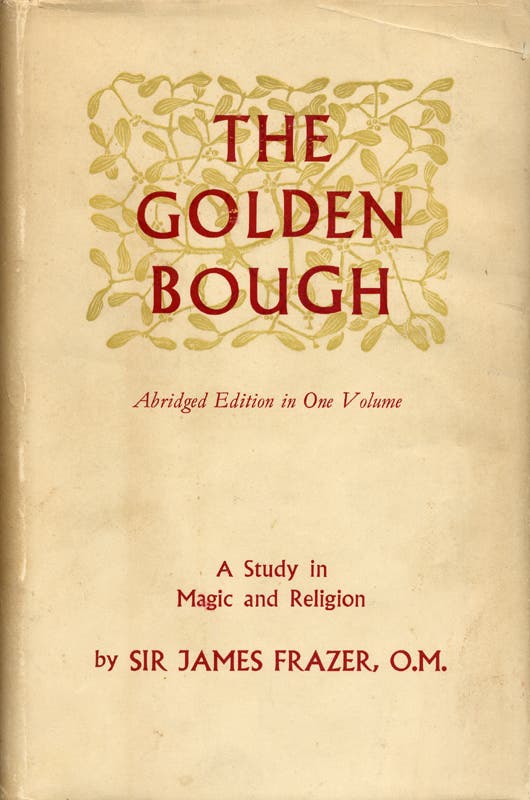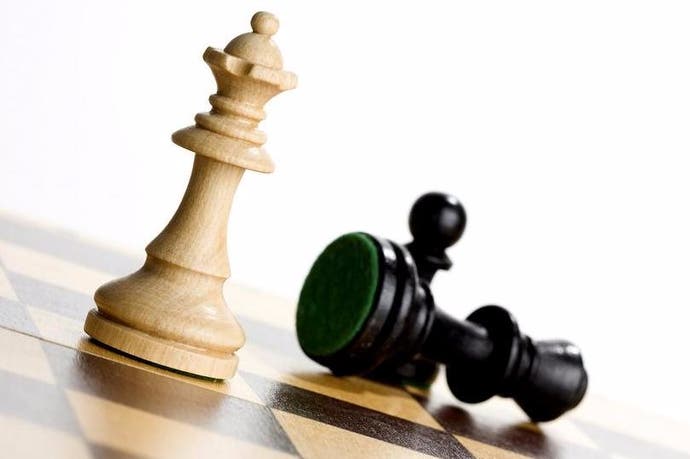Royal blood
Gods, war, and the Queen Sacrifice.
This article is dedicated to everyone who has ever played Sylvanas Windrunner too early in Hearthstone.
Before anthropology was really a thing, there was an anthropologist called Sir James George Frazer. Try saying that with a Glaswegian accent. It's like toasting the Fates.
Frazer's most famous for The Golden Bough, published in 1890 (not to be confused with the Golden Dawn, the occult order founded around the same time by the equally wonderfully sonorously named Samuel Liddell MacGregor Mathers, who was disappointingly from Hackney and not Scottish at all - help what has happened to this sentence - PULL UP KENNEDY PULL UP -)
The occult, religion, myth were all big in the dying years of the nineteenth century, which is why the Golden Dawn took off and why The Golden Bough sold so well, despite being prosaically subtitled 'A Study in Comparative Religion'. It was a colossally learned and influential account of myth and religious practice across the world, and its central thesis was that early religion revolved around a very particular narrative of kingship. That central thesis has been debunked now, but it's a hell of a narrative.
Frazer pointed out that myths are full of gods who die and return. They often do this for our benefit - dying to fertilise the earth or absolve us of our crimes, and returning in some changed state. (If you know Christianity, you might be thinking this sounds familiar, and you're right. It was one of the reasons The Golden Bough caused such a fuss - Frazier identified Christ as another dying god in another religion. In the age of Dawkins this sounds pretty tame, but it wasn't an 1890s-safe opinion).

Frazer's thesis, then, was that these early cultures often appointed a king who embodied the a fertility god who was married to the earth-mother. This is your classic god-who-dies-and-returns setup, but of course mortals can't die and return. So at the end of a year (or three, or seven) the locals would sacrifice the king and replace him with another one.
It might have happened somewhere; it probably didn't happen nearly as universally as Frazier suggested. But what a way to maximise the bang for your king buck. And as a political act, it's a lot simpler and more dramatically satisfying than an election.
Before board games were really a thing, there was a board game called chess. Proto-chess appeared in India and came to Europe via Persia, then Muslim North Africa, then the Moorish invasion of Spain.
The most important piece in chess is the king. But the most powerful piece is the queen. How come? Women didn't get much respect in the Middle Ages.
For starters, it looks like the queen wasn't originally the queen: when chess was the Persian game, it was the 'vizier' or 'advisor', the king's closest counsellor. As such, he was just a king-lite. His only legal move was to go one space diagonally, which made him barely better than a pawn. It seems that after chess came to mediaeval Europe - which allowed women a little more freedom than Muslim North Africa in the 700s, and had an occasional tradition of significant queens - that the name and gender of the piece were switched.
And then the queen got buff. I've seen it suggested that strong queens like Isabella of Spain and Elizabeth of England contributed to this idea, but it doesn't seem very plausible, not least because they came in quite late compared to the queen in chess. It does appear that chess got patched in the 1200s or so to make it faster and more exciting. So pawns got to move two spaces in their first turn, castling came in, and of course the queen got upgraded into a superpiece that combined the powers of bishop and rook. You wouldn't want more than two of those on the board, and you wouldn't want to zip your king around the place, so she was the obvious choice if you wanted to upgrade gameplay.
But, of course, with great power comes great vulnerability. The king is the prime target, but he rarely moves from his bunker at the board's edge. The queen is trouble. The queen goes everywhere, and everywhere she goes, she's a target.
So it's sometimes wise and always tempting to send her out in a blaze of glory: to sacrifice her for advantage. Savielly Tartakower, who was a grandmaster back when there were very few grandmasters, once said: "A queen sacrifice, even when fairly obvious, always rejoices the heart of the chess-lover."
But Rudolf Spielman, who would probably have been a grandmaster, but died eight years before grandmasters were invented, distinguished between real and sham sacrifices. A sham sacrifice is one where you immediately cover your losses - where it gets you a checkmate, or where you immediately promote a pawn to another queen. A real sacrifice is an act of foresight or faith. You give up your queen for a better position or as part of a longer term plan. It's dramatic and it's uncertain: you won't know for a while whether you've got sufficient bang for your queen buck.
Before nuclear bombs were really a thing, the Imperial Japanese Navy had lost the war in the Pacific. The Allies were poised to invade the Japanese Home Islands. But the invasion would cost more lives, and there was considerable uncertainty over how and when Japan might surrender. Further, the Allies were aware that the Soviet Union was poised to breach the Soviet-Japanese neutrality pact, declare war on Japan, and extend its influence into the Pacific.
So on August 6th, 1945, the USAAF detonated a nuclear weapon a quarter of a mile above the city of Hiroshima, killing around 110,000 people, mostly civilians, either at the time of the blast or from their injuries afterwards. On August 9th, they detonated another weapon over the city of Nagasaki, ultimately killing around 60,000 people. (In other words, the effect on human life was much the same as if every man, woman and child alive today in York were to be shot to death tomorrow.) On August 15th, Emperor Hirohito read the Imperial Rescript on the Termination of the War, announcing Japan's unconditional surrender.
Actually, it seems the Emperor actually read his speech a day or two before. It was recorded on a vinyl record for national broadcast - the 'Jewel Voice Broadcast' - later. Unfortunately, the Emperor had rarely if ever addressed the nation before, and used formal language and Classical Japanese. Further, the quality of the recording and the broadcast weren't great. And finally, the Emperor didn't actually say Japan was surrendering - only 'Our Empire accepts the provisions of [the Allies'] Joint Declaration'. So for hours or even days there was some confusion among the general population about what he actually meant; and of course a number of Japanese soldiers refused to surrender, fighting on for months and, in a few cases decades.
But actually actually, the Jewel Voice Broadcast almost didn't happen. A cadre of Japanese army officers, determined that the Emperor should not surrender, invaded the palace after the recording was made, searching for the record and threatening the officials with violence. Fortunately for history, they got lost in the palace, which was difficult to navigate and was kept in darkness because of allied bombings. The recording was smuggled out of the palace in a laundry basket ("of women's underwear", Wikipedia claims, although that last bit doesn't have a citation and I don't think women's smalls get segregated into separate baskets, even in Imperial Japan.) The recording was broadcast and World War II ended.
All this is by way of saying: history is complicated. The tragedy and the farce happen together. There is considerable debate, to this day, how justified the bombings of the two cities were. Dwight Eisenhower, Supreme Commander of the Allied forces, subsequently a two-term president of the USA, and no-one's idea of a pacifist, observed years later: "The Japanese were ready to surrender, and it wasn't necessary to hit them with that awful thing."
I am a pacifist, and my inclination is to agree with him. But I wasn't there and I don't know. The complications in the Imperial Palace are a tiny fraction of the complications across the continents in the waning days of the war, and it's not a straightforward question. But I do think this. The US had spent six years, billions of dollars, and the time of some of the finest scientific minds on the planet creating the most devastating weapons ever to exist. Was it really likely that, after all that, they wouldn't be used? Imagine the temptation - the temptation to cut through all the complication, and get real bang for all that buck.











